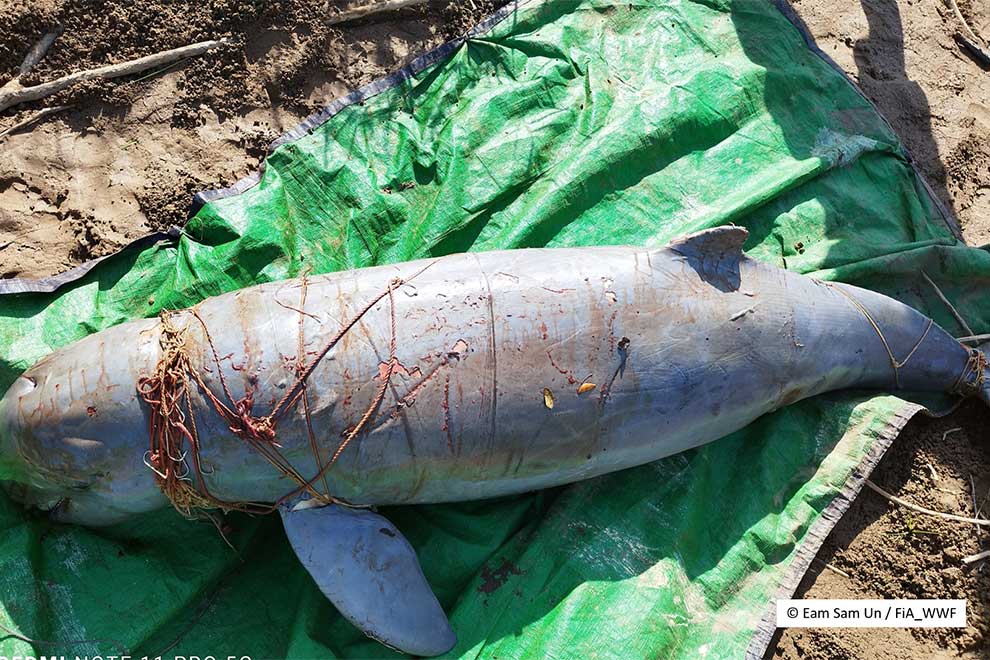
A dolphin was found dead near Koh Trong locating about 10 km below Anlong Kampi in Kratie province on December 24. WWF
The Global Fund for Nature and World Wide Fund for Nature Cambodia (WWF) have called on authorities to step up night and day patrols of dolphin conservation areas and prevent illegal fishing, as a third Mekong Irrawaddy dolphin carcass was discovered in the span of one week.
This was the 11th dolphin found dead this year, bringing the total number to 29 in the past three years.
In a December 25 press release, WWF said that the mammal a day earlier was found floating near Koh Trong, about 10km downstream from Kampi pool, Kratie province.
The dead dolphin was an adult female, measuring 196cm long. It was between 7 and 10 years old and weighed about 93kg, it added.
A detailed examination of the carcass by a research team from the Kratie Fisheries Administration Cantonment and WWF concluded that the dolphin tragically passed away after becoming entangled with a longline fishing hook.
WWF country director Seng Teak said that the recent increase in illegal fishing activities in the dolphin conservation areas will cause the extirpation of the Irrawaddy dolphin in Cambodia if stronger action is not taken immediately.
“These tragic and preventable deaths of three healthy breeding aged dolphins in less than 10 days should send a clear message to all responsible levels of authorities, that the time is now to step up the law enforcement presence in all critical dolphin habitats,” he added.
“There are no other options except to immediately implement strict law enforcement to crackdown on all types of illegal activities in the areas where dolphins live. To stop these activities, river-guards and law enforcement officers need to be active 24/7, conducting both day and night patrols in the dolphin zones,” Teak urged.
He said that in addition to increased patrols, severe penalties should be imposed on the perpetrators of fishery crimes committed in the dolphin conservation zones, in order to deter others from continuing these illegal activities.
“If this crisis continues, the entire population will be lost in the near future,” Teak added.
Ministry of Environment spokesman Neth Pheaktra expressed regret at the loss of the dolphin.
“I deeply regret receiving the news of the death of this freshwater dolphin. The dolphin is the third healthy dolphin to die in just seven days, prompting an urgent call for stronger law enforcement in the dolphin conservation zone,” he added.
Irrawaddy dolphins (Orcaella brevirostris) are considered part of the living national heritage of Cambodia. Fewer than 90 of them live in the Mekong River between Kratie and Stung Treng provinces.
An inter-ministerial working group led by the environment ministry is preparing to submit a request to the World Heritage List to include the dolphin as a biodiversity resource.
“During the recent zero-snaring campaign, I mentioned that the campaign also included the Kingdom’s waterways, and called on people not to enter the restricted dolphin zone, because very few dolphins remain. If breeding age specimens continue to die, we will end up losing them,” said Pheaktra.
The WWF said that the dry season, from December to May, is a critical period. As the water levels decrease, the dolphins and other species retreat to the deep pools of the dolphin zone. This makes them extremely vulnerable to illegal fishing. Strict law enforcement is especially needed during this time.
On December 22, another adult female was discovered dead in Koh Trong commune of Kratie province’s Kratie town. The body of an adult male was found floating in the river near the Koh Dambang deep pool area bordering Kratie and Stung Treng provinces on December 18. It was determined that both dolphins died after becoming entangled in fishing nets.












